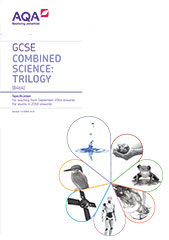Project Description
Course Overview
Our AQA GCSE Combined Science: Triology online course explores the basic principles and applications in biology, chemistry and physics
Through our AQA GCSE Combined Science: Triology online course you’ll learn key scientific concepts through a mix of theoretical and practical studies. Practical skills are developed using experiments suitable for home completion, alongside engaging animations. This course also explores science in a broader sense – for example, its impact on technology, its role and limitations in everyday life and in caring for the environment.
By studying science you’ll also develop skills of enquiry, accuracy, initiative and inventiveness – qualities that are highly valued by universities and employers.
Our AQA GCSE Combined Science online course is enhanced with lessons with a bank of resources, interactive tests and activities. The course focuses on strands of learning within the curriculum to improve progression throughout, offering a seamless progression.
The online course measures progression and assesses understanding with;
- Enables students to build, apply and review their understanding with worksheets and Quick Quizzes..
- Ensure understanding of the key concepts for the main topics with appropiate presentations.
- Provides complete specification coverage with a list of learning objectives.
This online course has been designed specifically to be studied online in your own time, at your own pace.
Course Options:
- Access to full course online
e-books provided
Workbooks* will be posted
Interactive quizzes*
Google Classroom Access
Tutor email support
Register your exams with us
About our teachers
Course structure – Self-study option
- Total course – 160 hours online
- Students are expected to study 6 hours per week, independently
- Enrolment fee: £80
- Course fee: £895
How to Apply?
- Complete the application form
- Send a scanned, coloured copy of your Passport or Driving License office@swanseacollege.com
- Pay the application fee of £200 (the application fee is made up of £80 enrolment fee and £120 towards the course fee, this fee is non-refundable)
Choose your Science Practical endorsement option:
- Complete Science Practical endorsements with Swansea College
- Carry forward from previous exam series (evidence required on application)
- Complete Science Practical endorsements with BioGrad
- If you opt out of practical endorsements. Your results certificate will display Not Classified (you must check the entry requirements for the university course you wish to study and see if the practical endorsement is a requirement)
Course Contents
You will study topics such as cell biology and bioenergetics in biology, chemical changes and chemistry of the atmosphere in chemistry, and energy and atomic structure in physics.
The course is structured into bite-sized parts:
Biology
- Cell structure
- Cell division
- Transport in cells
- Principles of organisation
- Animal tissues, organs and organ systems
- Plant tissues, organs and systems
- Communicable diseases
- Plant disease (biology only)
- Monoclonal antibodies
- Photosynthesis
- Respiration
- Homeostasis
- The human nervous system
- Hormonal coordination in humans
- Plant hormones
- Reproduction
- Variation and evolution
- The development of understanding of genetics and evolution
- Classification of living organisms
- Adaptations, interdependence and competition
- Organisation of an ecosystem
- Biodiversity and the effect of human interaction on ecosystems
- Trophic levels in an ecosystem (biology only)
- Food production (biology only)
Chemistry
- Atoms, symbols, relative atomic mass, electronic charge and isotypes
- The periodic table
- Properties of transition metals
- Chemical bonds, ionic, covalent and metallic
- Bonding and structure and their relation to the properties of substance
- Structure and bonding of carbon
- Bulk and surface properties of matter
- Nano particles
- Chemical measurements, conservation of mass and the quantitative interpretation of chemical equations
- Amount of substance in relation to masses of pure substances
- Yield and atom economy of chemical reaction
- Reactivity of metals
- Reactions of acids
- Electrolysis
- Exothermic and endothermic reactions
- Chemical cells and fuel cells
- Rate of reaction
- Reversible reactions and dynamic equilibrium
- Carbon compounds as fuels and feedstock
- Reactions of alkenes and alcohols
- Synthetic and naturally occurring polymers
- Purity, formulations and chromatography
- Identification of common gases
- Identification of ions by chemical and spectroscopic means
- The composition and evolution of the Earth’s atmosphere
- Carbon dioxide and methane as greenhouse gases
- Common atmospheric pollutants and their sources
- Using the Earth’s resources and sustainable development
- Life cycle assessment and recycling
- Using materials
- The Haber process and the use of NPK fertilisers
Physics
- Energy changes in a system
- Ways energy is stored before and after changes
- Conservation and dissipation of energy
- National and global energy resource
- Current, potential difference and resistance
- Series and parallel circuits
- Domestic uses and safety
- Energy transfers
- Static electricity
- Changes of state and the particle model
- Internal energy and energy transfers
- Particle model and pressure
- Atoms and isotopes
- Atoms and nuclear radiation
- Hazards and uses of radioactive emissions and of background radiation
- Nuclear fission and fusion
- Forces and their interactions
- Work done and energy transfer
- Forces and elasticity
- Moments, levers and gears
- Pressure and pressure difference in fluids
- Forces and motion
- Momentum
- Waves in air, fluids and solids
- Electromagnetic waves
- Black body radiation
- Permanent and induced magnetism, magnetic forces and fields
- The motor effect
- Induced potential, transformers and the National Grid
- Solar system
- Red-shift
- Stability of orbital motions
- Satellites
There are no previous entry requirements for this course, however students are expected to have a reasonable standard of literacy.
Exam and Assessment
2 written exams and practical assessments
Course Outcome
Upon successful completion of the practical assessment and exams, you will receive a GCSE in Combined Science
More information can be found in the specification.
Have a question? Ask our virtual assistant on live chat below
or call us on 01792 535000 and speak to our experienced Student Adviser.


